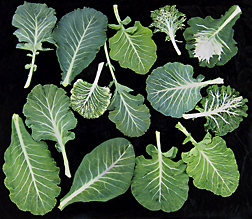This page has been archived and is being provided for reference purposes only. The page is no longer being updated, and therefore, links on the page may be invalid.
|
Read the magazine story to find out more. |
|
|
|
|
Preserving a Unique Collection of Carolina Collards
By Ann PerryApril 10, 2008
Some people comb through neighborhood yard sales and secondhand stores to find that one-of-a-kind treasure. Agricultural Research Service (ARS) plant geneticist Mark Farnham used similar tactics—but on a much larger scale—in his search for distinctive varieties of Carolina collards.
Collard, a cole crop related to broccoli, cabbage and cauliflower, has always been a local staple in the South. But its commercial cultivation expanded dramatically in the 20th century, and is now dominated by a few hybrid varieties.
Farnham, at the U.S. Vegetable Laboratory in Charleston, S.C., teamed up with Clemson University entomologist Powell Smith and Emory & Henry College geographers John T. Morgan and Edward Davis to look for unique collard varieties in the Carolina coastal plains.
The team of collectors wanted to find and preserve "heirloom" collards, local varieties of the leafy vegetable that had been cultivated from seeds passed down through generations. So for several years, they traveled through North Carolina and South Carolina in the late winter looking for signs of local collard production: dark green collard leaves or bright yellow blossoms.
If Farnham and his colleagues found a field where heirloom collards were being cultivated, they asked the owner if they could collect some of its seeds. During their travels, most of the growers they met—people who grew collard in garden plots for their own use, or to sell at local markets—were at least 70 years old.
The research team collected 87 distinctive collard seed samples from these small gardens—varieties that might otherwise have disappeared in the near future. Additional research is needed to see if these finds contain genetic material that plant breeders could use to enhance popular commercial collard hybrids and other cole crops.
The collard seeds are now kept in the U.S. Plant Introduction Collection of vegetable Brassicas in Geneva, N.Y., where scientists maintain facilities for the preservation of plant germplasm.
Read more about this research in the April 2008 issue of Agricultural Research magazine.
ARS is the U.S. Department of Agriculture's chief scientific research agency.

